 W
WTouron is a derogatory term combining the words "Tourist" with "Moron" to describe any person who, while on vacation, commits an act of pure stupidity. The term is considered park ranger slang that describes how some tourists act when entering a national park. The phrase indicates an act of ignorance and is known to be used in different subcultures. It is also used to describe tourists in general when they are outside their normal "comfort zone".
 W
WAn awkward squad is a group of individuals, normally within an existing organisation or structure, who resist or obstruct change, either through incompetence or by deliberate association.
 W
WBasketball is a team sport in which two teams, most commonly of five players each, opposing one another on a rectangular court, compete with the primary objective of shooting a basketball through the defender's hoop while preventing the opposing team from shooting through their own hoop. A field goal is worth two points, unless made from behind the three-point line, when it is worth three. After a foul, timed play stops and the player fouled or designated to shoot a technical foul is given one, two or three one-point free throws. The team with the most points at the end of the game wins, but if regulation play expires with the score tied, an additional period of play (overtime) is mandated.
 W
WA birthday is the anniversary of the birth of a person, or figuratively of an institution. Birthdays of people are celebrated in numerous cultures, often with birthday gifts, birthday cards, a birthday party, or a rite of passage.
 W
W"The Big Apple" is a nickname for New York City. It was first popularized in the 1920s by John J. Fitz Gerald, a sports writer for the New York Morning Telegraph. Its popularity since the 1970s is due in part to a promotional campaign by the New York tourist authorities.
 W
WBoundary rider is a long-established (1864) Australasian term for a cattle or sheep station employee whose duties entail a regular tour of the outer perimeter (boundary) of the property, checking condition of fences, collecting stock that may have escaped and ejecting strays that may have wandered onto the property, effecting any repairs that may be required, and reporting anything out of the ordinary to the owner or manager. On larger properties semi-permanent shelters may be provided for overnight accommodation, riders generally carrying their own swags.
 W
WCarny, also spelled carnie, is an informal term used in North America for a traveling carnival employee, and the language they use, particularly when the employee operates a game ("joint"), food stand, or ride at a carnival. The term "showie" is used synonymously in Australia.
 W
W"Cold turkey" refers to the abrupt cessation of a substance dependence and the resulting unpleasant experience, as opposed to gradually easing the process through reduction over time or by using replacement medication.
 W
WUndergarments or underwear are items of clothing worn beneath outer clothes, usually in direct contact with the skin, although they may comprise more than a single layer. They serve to keep outer garments from being soiled or damaged by bodily excretions, to lessen the friction of outerwear against the skin, to shape the body, and to provide concealment or support for parts of it. In cold weather, long underwear is sometimes worn to provide additional warmth. Special types of undergarments have religious significance. Some items of clothing are designed as undergarments, while others, such as T-shirts and certain types of shorts, are appropriate both as undergarments and as outer clothing. If made of suitable material or textile, some undergarments can serve as nightwear or swimsuits, and some are intended for sexual attraction or visual appeal.
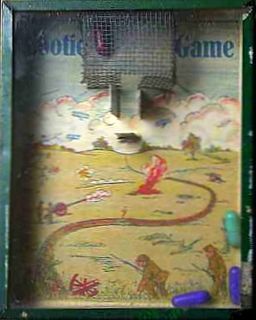 W
WCooties is a fictitious childhood disease, commonly represented as childlore. It is used in the United States and Canada as a rejection term and an infection tag game. It is similar to the British 'dreaded lurgi', and to terms used in the Nordic countries, in Italy, Australia and New Zealand. A child is said to "catch" cooties through close contact with an "infected" person or from an opposite-sex child of a similar age.
 W
WFuck is a profane English-language word. It often refers to the act of sexual intercourse, but is also commonly used as an intensifier or to denote disdain. While its origin is obscure, it is usually considered to be first attested to around AD 1475. In modern usage, the term fuck and its derivatives are used as a noun, a verb, an adjective, an interjection or an adverb. There are many common phrases that employ the word as well as compounds that incorporate it, such as motherfucker, fuckwit, fuckup, fucknut and fuck off.
 W
WDagmar bumpers is a slang term for chrome conical-shaped bumper guards that began to appear on the front bumper/grille assemblies of certain American automobiles following World War II. They reached their peak in the mid-1950s.
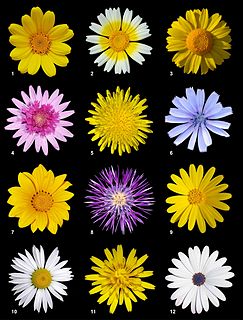 W
WA damned or damn yellow composite (DYC) is any of the numerous species of composite flowers that have yellow flowers and can be difficult to tell apart in the field. It is a jocular term, and sometimes reserved for those yellow composites of no particular interest. Notable individuals who referred to these difficult yellow composites as "DYCs" include Oliver Sacks and Lady Bird Johnson.
 W
WA decrepit car is a car that is often old and damaged and is in a barely functional state. There are many slang terms used to describe such cars, the more popular including beater, clunker, jalopy and banger.
 W
W"Dog and pony show" is a colloquial term which has come to mean a highly promoted, often over-staged performance, presentation, or event designed to sway or convince opinion for political, or less often, commercial ends. Typically, the term is used in a pejorative sense to connote disdain, jocular lack of appreciation, or distrust of the message being presented or the efforts undertaken to present it.
 W
WIn English grammar, certain verb forms are classified as auxiliary verbs. Although definitions vary, as generally conceived an auxiliary lacks inherent semantic meaning but instead modifies the meaning of another verb it accompanies. In English, verb forms are often classed as auxiliary on the basis of certain grammatical properties, particularly as regards their syntax. They also participate in subject–auxiliary inversion and negation by the simple addition of not after them.
 W
WEngrish is a slang term for the misuse or corruption of the English language by native speakers of Japanese, Korean and other Asian languages. The term itself relates to Japanese speakers' tendency to inadvertently substitute the English phonemes "R" and "L" for one another, a process known as lallation, because, unlike English, the Japanese language has only one liquid consonant. The same situation exists with Korean.
 W
WFanny Adams was an eight-year-old English girl who was murdered by solicitor's clerk Frederick Baker in Alton, Hampshire on 24 August 1867. The murder itself was extraordinarily brutal and caused a national outcry in the United Kingdom. Fanny was abducted by Baker and taken into a hop garden near her home. She was then brutally murdered and her body cut into several pieces, with some parts never being found. Further investigations suggested that two small knives were used for the murder, but it was later ruled they would have been insufficient to carry out the crime and that another weapon must have been used.
 W
WFat cat is a political term originally describing a rich political donor, also called an angel or big money man.
 W
WFuck-me shoes, alternatively fuck-me boots, is a slang term for women's high-heeled shoes that exaggerate a sexual image. The term can be applied to any women's shoes that are worn with the intention of arousing others. It is sometimes used to imply condemnation against the women who choose to wear them or in a misogynistic fashion toward the women who wear them.
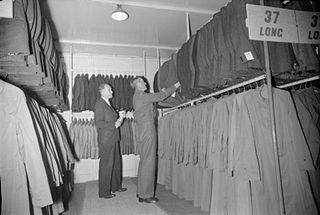 W
WThe full monty is a British slang phrase of uncertain origin. It means "everything which is necessary, appropriate or possible; 'the works'". Similar North American phrases include "the whole kit and caboodle", "the whole nine yards", "the whole ball of wax", "the whole enchilada", "the whole shebang", or "[going] the whole hog".
 W
WG-man is an American slang term for agents of the United States Government. It is especially used as a term for an agent of the Federal Bureau of Investigation (FBI).
 W
WA gas-guzzler, in informal language, is a vehicle that is perceived to consume a lot of fuel.
 W
WA humbug is a person or object that behaves in a deceptive or dishonest way, often as a hoax or in jest. The term was first described in 1751 as student slang, and recorded in 1840 as a "nautical phrase". It is now also often used as an exclamation to describe something as hypocritical nonsense or gibberish.
 W
WIn British slang, a "jam sandwich" or "jam butty" is a police car.
 W
WThe origin of the word jazz is one of the most sought-after word origins in modern American English. Interest in the word – the American Dialect Society named it the Word of the Twentieth Century in 2000 – has resulted in considerable research and the linguistic history is well documented. "Jazz" began as a West-Coast slang term around 1912. The meaning varied, but the word did not initially refer to music. "Jazz" came to mean "jazz music" in Chicago around 1915.
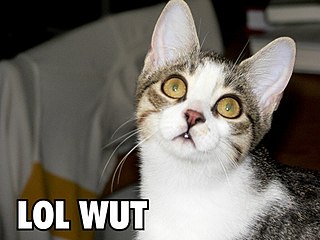 W
WLOL, or lol, is an initialism for Lots Of Love and a popular element of Internet slang. It was first used almost exclusively on Usenet, but has since become widespread in other forms of computer-mediated communication and even face-to-face communication. It is one of many initialisms for expressing bodily reactions, in particular laughter, as text, including initialisms for more emphatic expressions of laughter such as LMAO and ROFL or ROTFL. Other unrelated expansions include the now mostly obsolete "lots of luck" or "lots of love" used in letter-writing.
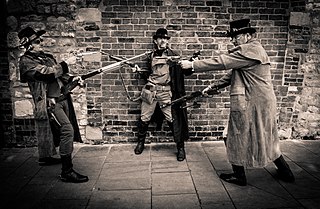 W
WA Mexican standoff is a confrontation in which no strategy exists that allows any party to achieve victory. Any party initiating aggression might trigger its own demise. At the same time, the parties are unable to extricate themselves from the situation without suffering a loss – effectively, a situation of mutual zugzwang. As a result, all participants need to maintain the strategic tension, which remains unresolved until some outside event makes it possible to resolve it.
 W
WA muffin top is a slang term typically used to describe a person's body fat that extends horizontally over the edges of the waistline of tightly fitting pants or skirts, visible when there is a gap between the upper and lower garment. The term is a reference to the way a muffin appears when it has been baked in a muffin tin, so that the top of the muffin extends horizontally over and around the top of the tin or casing.
 W
WCannabis has many different names, including more than 1,200 slang terms, and more than 2,300 names for individual strains. Additionally, there are many names to describe the state of being under the influence of the substance. The dried leaves and flowers harvested from cannabis have many uses.
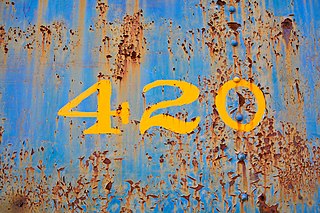 W
WMore than 1,200 slang names have been identified for marijuana and hashish, the dried leaves and flowers harvested from cannabis for drug use, including:
 W
W"Napoleon Complex" is a theorized inferiority complex normally attributed to people of short stature. It is characterized by overly-aggressive or domineering social behavior, such as lying about earnings, and carries the implication that such behavior is compensatory for the subject's physical or social shortcomings. In psychology, the Napoleon complex is regarded as a derogatory social stereotype.
 W
WOK is an English word denoting approval, acceptance, agreement, assent, acknowledgment, or a sign of indifference. OK is frequently used as a loanword in other languages. It has been described as the most frequently spoken or written word on the planet. The origins of the word are disputed.
 W
WOverkill is the use of excessive force or action that goes further than what is necessary to achieve its goal. It may be a literal term referring to physical damage, though it is also used in colloquial conversation as a metaphor. An example is killing an ant with a sledgehammer.
 W
WThe Oxford "-er", or often "-ers", is a colloquial and sometimes facetious suffix prevalent at Oxford University from about 1875, which is thought to have been borrowed from the slang of Rugby School. The term was defined by the lexicographer Eric Partridge in his Dictionary of Slang and Unconventional English.
 W
WA pissant, also seen as piss ant or piss-ant, refers to a specific type of ant. The word is also used as a pejorative noun or adjective, indicating insignificance.
 W
WThe terms podunk and Podunk Hollow in American English denote or describe an insignificant, out-of-the-way, or even completely fictitious town. These terms are often used in the upper case as a placeholder name, to indicate "insignificance" and "lack of importance".
 W
WPrison slang is an argot used primarily by criminals and detainees in correctional institutions. It is a form of anti-language. Many of the terms deal with criminal behavior, incarcerated life, legal cases, street life, and different types of inmates. Prison slang varies depending on institution, region, and country. Prison slang can be found in other written forms such as diaries, letters, tattoos, ballads, songs, and poems. Prison slang has existed as long as there have been crime and prisons; in Charles Dickens' time it was known as "thieves' cant". Words from prison slang often eventually migrate into common usage, such as "snitch", "ducking", and "narc". Terms can also lose meaning or become obsolete such as "slammer" and "bull-derm."
 W
WRed tape is an idiom referring to regulations or conformity to formal rules or standards which are claimed to be excessive, rigid or redundant, or to bureaucracy claimed to hinder or prevent action or decision-making. It is usually applied to governments, corporations, and other large organizations. Things often described as "red tape" include filling out paperwork, obtaining licenses, having multiple people or committees approve a decision and various low-level rules that make conducting one's affairs slower, more difficult, or both. Red tape has been found to hamper organizational performance and employee wellbeing by meta-analytic studies in 2020.
 W
WRude Britain is a 2005 book of British place names with seemingly rude or offensive meanings. The book (ISBN 0-7522-2581-2) is written by Rob Bailey and Ed Hurst, and published in the United Kingdom by the Pan Macmillan imprint Boxtree.
 W
WShite-hawk or shit-hawk or shitty hawk is a slang name applied to various birds of prey that exhibit scavenging behaviour, originally and primarily the black kite, although the term has also been applied to other birds such as the herring gull. It is also a slang derogatory term for an unpleasant person.
 W
WThe potato is a root vegetable native to the Americas, a starchy tuber of the plant Solanum tuberosum, and the plant itself is a perennial in the nightshade family, Solanaceae.
 W
WStage Irish or Paddywhackery is a stereotyped portrayal of Irish people once common in plays. The term refers to an exaggerated or caricatured portrayal of supposed Irish characteristics in speech and behaviour. The stage Irishman was generally "garrulous, boastful, unreliable, hard-drinking, belligerent and chronically impecunious." This caricature includes many cultural outlets, including the stage, Punch cartoons and English language cliché, such as the terms "Paddywagon" and "hooligan." Collectively, this phenomenon is called "Paddywhackery."
 W
W"Symphony in Slang" is a 1951 cartoon short directed by Tex Avery, written by Rich Hogan and released with the feature film No Questions Asked by Metro-Goldwyn-Mayer. Minimalist and abstract in style, it tells the story of a man, who finds himself at the Pearly Gates explaining the story of his life to a bewildered Saint Peter and Noah Webster using slang of that era. The majority of the short is made up of sight gags based on Peter and Webster's imagined, literal understandings of such phrases as "I was born with a silver spoon in my mouth" and "Outside it was raining cats and dogs."
 W
WRonald Macdonald Hutchison, professionally known as Harry Tate, was an English comedian, who performed in the music halls, in variety shows, and in films.
 W
WThe slang or colloquial term tinnie or tinny has a variety of meanings, generally derived from some association with the metal tin, or aluminium foil which has a loose allusion to tin.
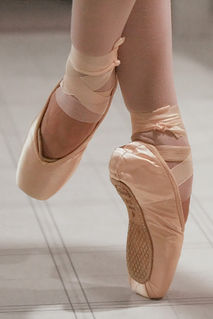 W
WTiptoe describes the human body posture and locomotion of removing the heel(s) of one or both feet from the ground. The term is mostly used colloquially when the weight is placed on the balls of the feet rather than literally on the tips of the toes; literal tip-toeing is difficult but possible, as in the pointe technique of ballet. In running, landing on the ball of the foot is known as forefoot strike.
 W
WA truce term is a word or short phrase accepted within a community of children as an effective way of calling for a temporary respite or truce during a game or activity, such as tag or its variants. Common examples in English speaking cultures are barley, fainites, crosses, kings and exe(s)in the United Kingdom, pegs and nibs in New Zealand and variants of barley in Australia. In the United States, terms based on time-out have, from the 1950s onwards, largely supplanted earlier common terms based on kings and exe(s). Since the late 1980s time-out has been recorded in other English speaking cultures besides the US. Examples of use of truce terms are if a child has a stitch or wants to raise a point on the rules of the game.
 W
WAn Undie Run is an event where a large number of people disrobe until they are only wearing underwear, and then run. The site of Undie Runs are typically college campuses, but they may occur on other sites such as streets. Undie Runs may be purely for entertainment, a form of protest, or as with the ASU Undie Run, fund-raising for charitable purposes. It is reported that the Guinness Book of World Records considers the Undie Run that took place on September 24, 2011, in Salt Lake City, Utah, United States to have had a record number of participants. There were 2,270 participants in that Undie Run, which was held to protest Utah's conservative laws. COED Magazine, a magazine in the United States marketed to college students, has reported that Undie Runs are the "number one university sanctioned event".
 W
WWhoonga is a form of black tar heroin, possibly mixed with other substances, that has come into widespread use in South Africa since 2009. Its use is concentrated in the impoverished townships of Durban, although it is claimed to be appearing in other places in South Africa as well.
 W
WThe Industrial Workers of the World (IWW), members of which are commonly termed "Wobblies", is an international labor union that was founded in 1905 in Chicago, Illinois, in the United States. The union combines general unionism with industrial unionism, as it is a general union, subdivided between the various industries which employ its members. The philosophy and tactics of the IWW are described as "revolutionary industrial unionism", with ties to socialist, syndicalist, and anarchist labor movements.